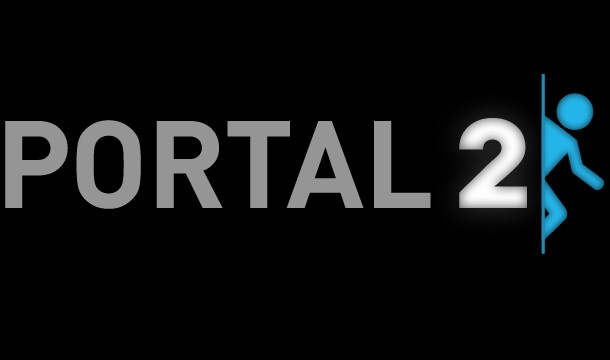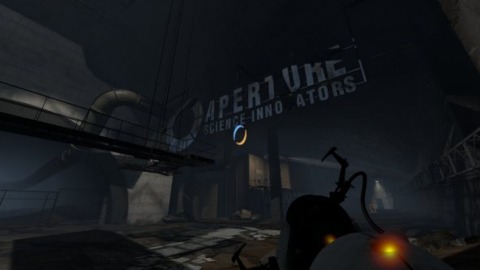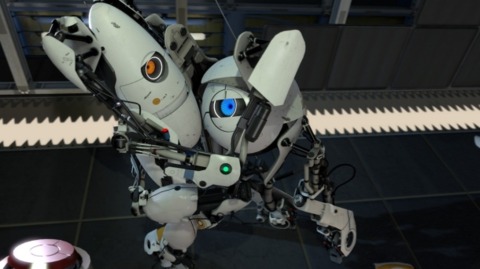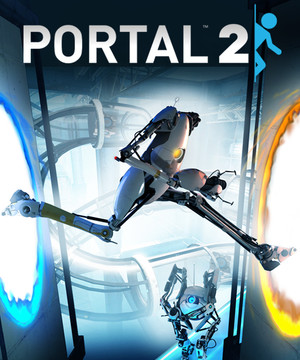Do you see what I see?

The story in Portal 2 is actually infinitely better than the original right from the get-go, since it doesn’t wait for the last half hour to tell it, and actually presents some character and intrigue at the very beginning. After your character, Chell, was lazily dragged back into the Aperture Science building in a cutscene that roughly 20% of the people who played Portal got to see, she was put into a comatose state in a simulation hotel room. She is released from her summer-themed prison by a little metal eyeball (that is modeled after the cores you destroy in the original game). Your robotic compatriot is named Wheatley, who is voiced fairly well by Stephen Merchant, who some of you may know from The Office. I prefer to remember him as Peter Ian Staker from Hot Fuzz, myself. Anyway, after it is revealed that Chell is the last surviving test subject to be involved with Aperture Science, she and Wheatley then attempt to escape from the building, in what ends up being a rather exciting journey that reveals far more about Aperture than what we were shown in the original Portal. Black Mesa actually gets its name dropped at one point, and not just in the credits song. The story is interesting, but it does suffer from a few issues, including two incredibly predictable twists and the fact that Chell is just another silent protagonist with no discernable characteristics. Regardless, I momentarily forgot every problem I had with the game when I reached the ending: let me just say, it was indescribably kickass.
The performances really do help the plot, with the help of a particularly strong cast, including Ellen McLain reprising her role as GLaDOS, the previously mentioned Stephen Merchant, J.K. Simmons as Aperture CEO Cave Johnson and even Nolan North as some assorted voices (fuck me, he IS in everything). J.K. Simmons is easily the high point here, since he was the only character who could make me laugh with any sort of consistency. I don’t really want to spoil any of his jokes, but I will say that there is an implied situation involving Praying Mantis DNA that deserves its own spinoff game.
Speaking of jokes, it needs to be said that Portal 2 is far funnier than its predecessor, at least in my personal opinion. That said, I didn’t find the original game to be funny at all, in the slightest. And, honestly, I couldn’t comprehend why anyone would have found any of the writing funny. Now Portal 2 solves this problem, but considering damn near every line in the game is supposed to be received as humorous, a cynical person could still say Portal 2 fails to deliver on the humor, since the jokes elicited a positive response from me (usually nothing more than a smile/chuckle) roughly 25% of the time. I’m sad to say I spent the majority of the game relatively stone-faced. However, the quality of the writing is certainly better near the end of the game, and I did occasionally laugh at the antics of Wheatley and the ramblings of Cave Johnson. But it is certainly not one of the funniest games ever, as some people have claimed. I laughed harder at some of the jokes in LA Noire, really. Hell, the jokes in GTA IV are much funnier, for the most part. But still, given the frequency of the jokes, a 25% return isn’t too bad.
But what makes Portal 2 so special is the quality of the gameplay and level design. Simply put, the puzzles are mostly designed well, with almost puzzle taking a certain level of ingenuity and creativity to complete. The puzzles feel much better than those in the original Portal, mainly because they are more intricate, and more varied, thanks to the inclusion of other mechanics besides the "innovative" portal gun. Portal 2 adds lasers (which function similarly to the Half-Life Power balls from Portal 1), light bridges, jump pads, and three different kinds of goo (super-speed, super-jump, and a white goo that makes walls portal-able) to the mix. The different elements add a great amount of variety, which a game like this desperately needs to be fun from start to finish. The puzzles really do make you think, and requires a level of concentration that few games require nowadays. Oh, and flying around a room with jumppads is a hell of a lot of fun. I honestly have a hard time describing what exactly I like so much about the puzzles in Portal 2, but suffice it to say that they are fun and require some ingenuity and thought.
As fun as the puzzles are, they are certainly far from perfect. The physics are fun when the player is flying around the test chambers, but they feel a little inconsistent, as if gravity changes every time a test chamber is entered. Simply put, the player gains altitude and velocity far too quickly in a few test chambers, and far to slowly in others. Also, the puzzles that involve spraying goo all over the walls feel inconsistent as well. Some of the puzzles are more difficult to solve than they should be because the goo spreads in an irregular pattern when hitting certain, unassuming walls, because they contain the mystical solution to the puzzle. Also, because of the decrepit nature of Aperture Science, the roughly half of the puzzles have walls that are only about ten percent portal-compatible. As a result, the player's success in proceeding through the game is largely hinged on the ability to spot where they should place their portals, instead of figuring out that fact on their own. While this design probably was intended to reduce frustration by giving the player limited options, this generally increased frustration, since most of the puzzles seem almost impossible until the player spins the camera around enough to spot every last clean wall. This is easily done in the test chambers, but less so when exploring the rest of Aperture. Also, this style of design does occassionally lessen the satisfaction of completing the puzzles. Instead of feeling brilliant when you complete a puzzle, you feel like a moron. Evoking that feeling in the player is a detriment to the overall experience.
In terms of gameplay design, the weakest parts of the game are easily the sections where Chell has to explore the inner workings of Aperture. These sections completely depend on the player spotting little bits of white walls from a long distance, and can easily become frustrating. The game also does not do a great job of telling you where the hell you need to go during these parts, adding to the frustration. The game's fetish for destroyed scenery gets in the way, since you'll often be forced to use broken areas as platforms, which makes it hard to rule out any peice of scenery when trying to locate the path forward.
The controls are the same as the prior installment for the most part, with the exception of a zoom function that is extremely necessary for navigating Aperture Science's innards. An activity the player takes part in often is something I like to call "portal sniping." The controls work very well, for the most part, with the only real issue being the actual handling of the characters. The player feels in control of their avatar at all times, but Chell's movement feels far too heavy. Chell feels large as well, since it is a little too difficult to fit through portals in certain situations. It doesn't help that she can only jump 3 inches off the ground and has an extremely slow movement speed. Controlling Chell feels a lot like controlling a heavy in Team Fortress 2, which is odd, because Chell is, well, thin.

For those of you who stayed with me during that tortured comparison, I suppose I should mention that there is a Coop mode in Portal 2, featuring two robots named Atlas and P-body. This mode is largely similar to the single player game, with the same strengths and pitfalls. A few new mechanics are added, including a little command system that allows each player to mark where their partner should place a portal. Also, there is a much-adored system where the two partners can interact by high-fiving or performing taunts. Now, let me say three words to anyone who thinks this system is unique: Army of Two. Specifically, Army of Two: The 40th Day, since there is rock/paper/scissors. Take a moment to remember that and let's move on.
The puzzles in coop are naturally more complex than those in the single-player, since they require the use of 4 portals instead of just two. They are just as satisfying to solve as the puzzles in the campaign, and the puzzles lead to plenty of goofy coop fun. But it's got a few issues of its own. The humor is worse than it was in the campaign, since it literally just consists of GLaDOS insulting the two robots and accusing them of having human qualities. The other major problem is that the end of the coop campaign sets up the now-inevitable Portal 3. This game should not have a sequel. There should not be anymore Portal games, at least not until the Half-Life series is complete. That's right Valve, I'm calling you out! Finish Half-Life 3, for fuck's sake!

The greatest benefit to the cooperative campaign is that it essentially doubles the length of the game. The campaign and the coop take roughly 6 hours each, which just barely justifies the 60 dollar purchase. The rich atmosphere of the single player warrants maybe one more playthrough, but there isn't much replay value in Portal 2 (given that it's a puzzle game, y'know, not much to do after you beat it once). For people who are sparing with the cash they dole out on video games, there are games with more bang for your buck.
Also, there is one major problem with this game that I forgot to mention: the loading screens. They are not long at all; the issue is frequency. You hit a loading screen every 5 minutes, give or take. There are a few scenarios where the player literally does nothing but listen to someone talk for 30 seconds then is taken to another loading screen. The relative brevity of each loading screen makes them tolerable, but it's still probably the biggest flaw in the entire game.
While there is plenty to complain about regarding Portal 2, it's still a hell of a lot of fun. The plot is much better than its predecessor, the writing is funnier (for the most part), and the gameplay is more vaired. But in the end, its flaws hold it back from excellence, and restrict it to moderate greatness.
Oh, and "Still Alive" > "Want You Gone"
